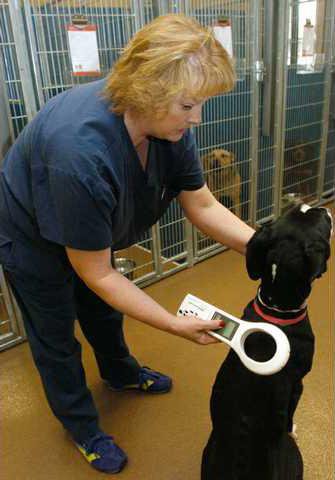The Hall County Animal Shelter already is taking all the measures that state representatives called for last week to protect animals and their owners.
Two bills passed by the state House of Representatives last week would require shelters to scan for microchips before euthanizing and animal and would prohibit shelters from using gas chambers as a method of animal euthanasia.
Meghan Seabolt, the onsite veterinarian at the county shelter, said the bills, if approved by the state Senate and signed by the governor, won’t change anything in Hall County. The shelter already scans animals “multiple” times for microchips and only uses lethal injection to euthanize animals.
“We’ve never used anything else, and never would,” said Seabolt.
Lethal injection is the most humane and the quickest way to euthanize animals, she said.
The Hall shelter euthanizes animals, depending on their health, their behavior and space constraints in the shelter. Healthy animals that are not aggressive are kept in the adoption facility for at least two weeks before they are euthanized because of lack of space, Seabolt said.
“We have a lot of guys that have been here a couple of months,” she said.
When animals are euthanized, Seabolt said shelter workers try to “do it as humanely as possible.” She said the shelter staff is highly-trained in euthanasia and try to make the process quick and stress free.
The lethal injection method takes about 30 seconds.
Euthanizing pets with carbon monoxide is a method that takes longer, places more stress on animals, Seabolt said. The American Humane Association, which supports lethal injection as the only form of euthanasia, says the carbon monoxide method takes up to 30 minutes.
But Seabolt said the gas chamber method also could harm humans.
“It’s pretty dangerous for the people that are around the gas chambers,” said Seabolt. “There are still some shelters that do it that way. It’s an acceptable method of euthanasia, but the shelters that do it are strongly encouraged to convert to IV injections.”
Currently, 15 states prohibit shelters from using carbon monoxide as a method of animal euthanasia, according to the American Humane Association, an animal and child-welfare nonprofit agency.
But when House Bill 788, which outlaws the use of gas chambers, came to a vote on the House floor last Tuesday, State Rep. Gene Maddox, a veterinarian from Cairo, argued against it. Maddox said carbon monoxide chambers were the most humane way to put down wild or feral animals who are not used to being handled by humans. Thet bill, sponsored by Cumming Rep. Tom Knox, was approved by a 115-46 vote.
It, along with House Bill 1106, are now in the hands of the Senate.
The second bill, sponsored by Maddox and unanimously passed Wednesday by the House, requires shelters to scan animals for an identifying microchip when an animal is brought to the shelter and again before euthanizing it.
If a chip is detected, the bill requires shelter employees to make a reasonable effort to locate the owner.
Animals sent to Hall County’s animal shelter are already scanned for a chip at least three times, Seabolt said.
“We scan them when they come in the door if they’re a public dropoff, and the animal control officers scan them when they pick them up, and then, we scan them again when we process them — do their vaccines — when they come in,” Seabolt said. “And then we scan them a third time right before we euthanize them just to make sure we haven’t missed a chip somewhere along the way.”
The Associated Press contributed to this report.




